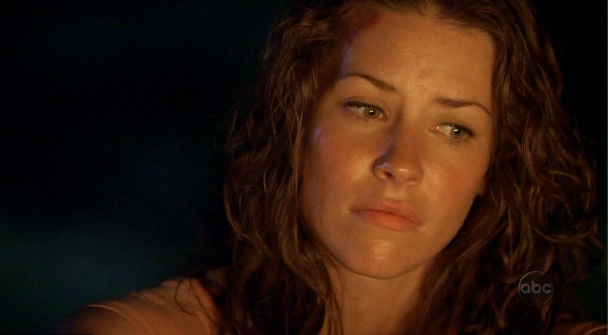The first two episodes of LOST stand pretty firmly on their own merits. Like any television pilot, they encapsulate the world that they are introducing us to. Pilots have to do extra duty just to get us all on the same playing field with characters, history and the more generic “rules” that govern that particular version of the universe. So it’s no wonder that most shows fail to adequately live up to the efficiency or prowess of their first episode.
LOST‘s third episode treads the line between rehashing the plot and narrative elements that made the pilot great and striking out into new ground with the characters and story. They do resort to some tired, “here’s what happened last time” style dialogue, but it’s brief and is a nice refresher (for those of us watching week-to-week). From there it dives directly into character development. I said it before but it bears repeating: the characters carry this show. In fact, the second episode is almost entirely character driven. Large chunks are given over to Kate’s back-story and to Jack’s struggle to keep the US Marshall alive without the aid of modern medicine. It’s compelling television and I’m impressed that while juggling these larger characters arcs, the show also has time to stop and examine several other minor character relationships as well as set up new ones.
The ones that really matter here are between Kate, Jack and Sawyer. But also we have another good look at Walt and his dad, Hurley and Jack as well as a few of the minor characters popping in. I’d be remiss if I didn’t acknowledge that these new (largely binary) relationships tie back to Locke’s little speech about good and evil (light vs. dark) in the second half of the pilot, and to be honest the show lays it on a little thick at times. The worst is the encounter between Jack and Sawyer on the plane. Second worst is Jack and Kate on the beach. LOST spares not time letting us know that it’s about to get Biblical.
Which brings me to the next point: LOST significantly ups the melodrama in episode three. I can live with a little melodrama interspersed between the action. I don’t even know if it bothered me as much as the accompanying strings (and well-timed rainstorm) did. On the bright side, if this show sinks any further into soap opera territory I’ll officially have “shows.”
Which, I mean, who am I kidding? I watch Community and The Office like it was my job.
Anyway, what the third episode weirdly avoids any of the strange, interesting or profoundly weird plot points that were revealed in the pilot. In fact, it’s almost like this episode came from a completely different show. Sure there are call backs to the previous episode; characters are still worried about Polar Bears and not being able to contact the mainland because of an ominous signal blocking their efforts. But “Tabula Rasa” is purely and wholly about the characters. It’s good that we’re taking time now to get to know them, but still this episode struck me more as a lost chapter of Robinson Crusoe than it did one of a science fiction mainstay. Are we meant to read hope in the last scene of this episode? Joe Purdy’s sweet “Wash Away” seems to herald a change in fortune for the stranded survivors. I know that things are only going to get worse, so the song seems incongruous. The ending is more ironic than cathartic, but still. Were I watching this show six or seven years ago I’d be apathetic about the ending. Because at this point it seems like Swiss Family Robinson just got revived for the twenty first century. Give me monsters, give me danger. We’re on the edge of the map guys, let’s hope the next episode raises the stakes.
Grade: B+
Spare Thoughts:
- Is that opening campfire a metaphor for LOST‘s writer’s room? “Tell them what we know — they lose hope.”
- Kate seems to find it necessary to keep Jack in the loop.
- Why is this show so amazing to look at? It’s eye candy for sure.
- Still funny (although most of the humor falls squarely to Hurley in this episode).
- Man, that got dark there for a second.
- “We all died” — the greatest (non) Red Herring in the history of sequential narratives.
- If Locke isn’t already the bad guy by now I don’t really know what the fuck is going on.
(image source: Lostpedia

![It’s Official: Vertigo is Better than Citizen Kane If anyone else is sick of pseudo-cinastes topping their best-of lists with Citizen Kane, well there’s relief in sight. The Sight & Sound poll has listed Vertigo at the top of its […]](http://jonqpublic.com/wp-content/themes/arras/images/thumbnail.png)